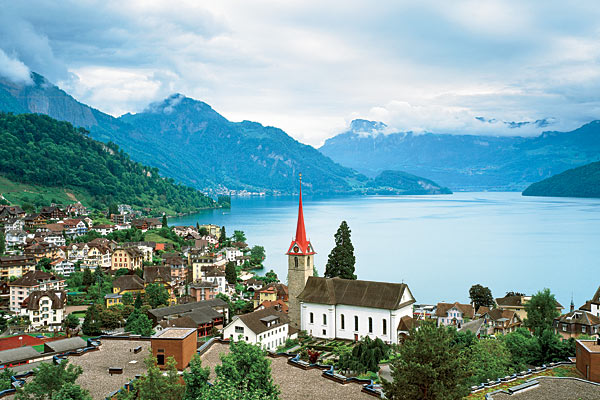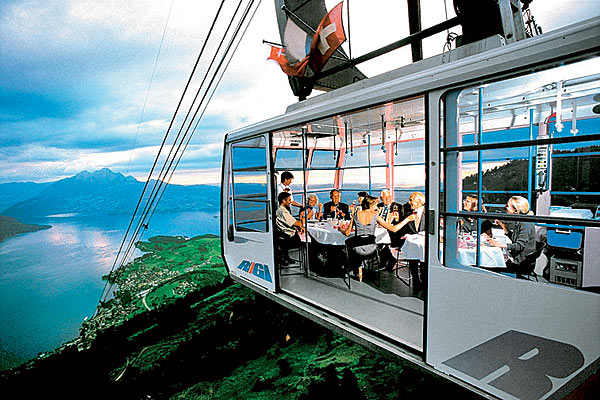
Recreation abounds in the lakeside hamlet
DESTINATION Weggis, Switzerland
DISTANCE FROM CHICAGO 4,400 miles
OUR GUIDE Welz Kauffman, president and CEO of Ravinia
WHAT HE LOVES ABOUT WEGGIS The clean, crisp air
The cobblestone streets of Weggis, Switzerland, aren’t generally bustling with the starry roster of maestros that makes Lucerne the annual mecca for upward of 120,000 festivalgoers. The capital of a 17-town area, Lucerne is the district’s major draw, naturally, since it hosts three of the classical music world’s most revered festivals; the largest and oldest—the summer festival—runs this year from August 10 through September 18. But Weggis, a 45-minute ferry ride away, is no less alluring, says Welz Kauffman, the president and CEO of Ravinia in Highland Park.
In a country known as a skier’s paradise, Weggis sits on a thumb-shaped promontory in a zone where mild temperatures allow olive trees to thrive. If you want a panoramic view of greenery reaching toward white-dusted peaks, you can ride a cable car dangling 4,000 feet above Lake Lucerne. If you prefer to earn the dizzying view, you can hike up hundreds of miles of trails. You can also bask in the town’s rich artistic heritage. Franz Liszt did much of his composing there. Mark Twain famously explored Weggis’s Mount Rigi during the summer of 1878, eventually extolling the peak’s beauty in his travel memoir A Tramp Abroad.
“A century ago, people came to Weggis for health reasons, to take the waters,” Kauffman says, referring to the natural mineral baths. “They still do. The air, the water, the mountains—everything there just feels so healthy.” Today, the ancient town, which dates to the ninth century, offers resorts, spas, and top-flight restaurants. Yet for all its posh modern amenities, Weggis remains genuinely bucolic, thanks in large part to a moratorium on building along the water. From the Zurich airport, the taxi ride to the lake district takes about an hour. “Between the airport and the lake, my head completely clears,” says Kauffman, 50, who has visited Weggis four times since 2006. “I become more open to the kind of contemplative thinking that Chicago, much as I love it, doesn’t always allow.”
Development has been halted along the lake, but several homes still dot the waterside landscape. Among them: Sergei Rachmaninoff’s summer villa, now occupied part-time by Alexander Rachmaninoff, the grandson of the legendary Russian composer. In Weggis, he oversees the Rachmaninoff Foundation, a nonprofit organization that supports concerts and musical education around the world—including the all-Rachmaninoff programs in Highland Park. (This year’s Ravinia events are slated for July 21 and September 7.) In 2006, Kauffman, while attending a performance in Geneva, received an invitation from Rachmaninoff to meet in Weggis.
Photograph: Panoramic Images

Alfresco dining, Weggis-style: A cable car near the top of Mount Rigi
“Alexander said we could go hiking, which I wasn’t completely enthused about,” Kauffman recalls. “Heights don’t bother me, but falling does, and I am a terrible klutz. But he was pretty insistent. The man is in his 60s, and he’s a world-class mountaineer.” The miles-long trek turned out to be a revelation—including the bovine bell chorale Kauffman experienced. “[Cows are] grazing everywhere, each one with that bell around its neck. And those bells, they’re all different notes,” he says. “So there’s this constant chorus of bells, echoing all around you.” He did not tumble down Mount Rigi while hiking that day, but he did fall for the breathtaking scenery.
“I think Alexander and I went hiking maybe three times together, over the course of a few years, before he let me in his grandfather’s studio,” says Kauffman, an avid jazz and classical pianist. Although he enjoys playing many pieces by Rachmaninoff, his favorite is the composer’s final work, the Paganini rhapsody, a massive half-hour opus that unleashes the key of A minor in almost a dozen variations. Kauffman’s visit to the studio in 2008 was worth the wait—for a pianist, about as close to the holy grail as one can get, short of discovering the rest of Mozart’s unfinished Requiem. “I sat at Rachmaninoff’s piano and played the Paganini, which he composed in Weggis,” Kauffman says. “It was surreal. I played Bach and Beethoven from Sergei’s actual manuscripts. All of his notes, still in the margins.”
ESSENTIAL INFORMATION
Visiting Mount Rigi (rigi.ch) is a must, whether you hike, take a train, ride the cable cars, or plan a combination of all three. Among the numerous trails, a good half-day walk for intermediate hikers starts in Weggis and goes up roughly 3,280 feet to Rigi-Kaltbad. At the top, you can see Weggis and Lake Lucerne. Mount Pilatus (pilatus.ch) offers a day trip on what is billed as the world’s steepest cogwheel railway. The train travels a 48 percent grade that reaches almost 7,000 feet; roundtrip tickets from Lucerne cost about $90. Lucerne’s music festivals (lucernefestival.ch/en) are held annually in March, August, and November.
WHERE TO STAY One of Kauffman’s favorite reading spots is the balcony of his room at Relais and Châteaux Park Hotel Weggis (34 Hertensteinstrasse; phw.ch). He has stayed at the hotel on three visits. The 52-room lakeside boutique inn offers mineral baths, massages, and a Japanese garden. Nightly rates start at about $420 for a single room and around $3,200 for a two-bedroom suite. The family-run SeeHotel Gotthard (11 Gotthardstrasse; gotthard-weggis.ch), has 16 rooms and shares a recreation area—swimming pool, steam bath, and solarium—with the adjacent Beau Rivage Hotel (6 Gotthardstrasse; beaurivage-weggis.ch). Rates at the SeeHotel Gotthard range from about $180 to $390 per night; rates at the Beau Rivage are available at info@beaurivage-weggis.ch.
WHERE TO EAT Kauffman has found the hotel restaurants of Weggis to be world-class. He loves the escargot at Beau Rivage, where diners can choose between the white-tablecloth restaurant or the casual awning-covered terrace. The husband-and-wife owners, Dorly and Urs-Peter Geering, specialize in locally caught fish. Fresh fish is also on the menu at the Park Hotel’s Sparks, where brook trout and white catfish are staples; the Annex, also at the Park, offers multicourse prix fixe dinners.
Photograph: Panoramic Images


